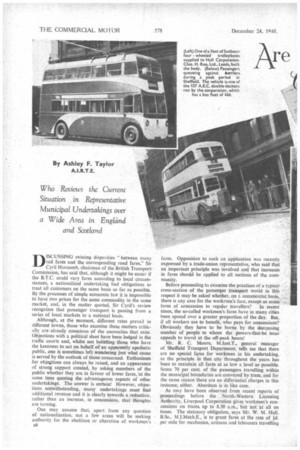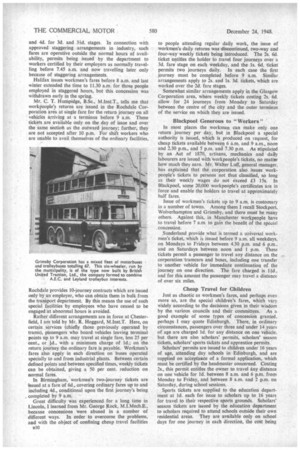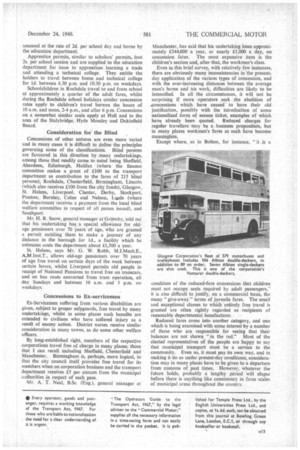no he Fares
Page 43

Page 42

Page 44

Page 47

If you've noticed an error in this article please click here to report it so we can fix it.
truc Lure ?
Who Reviews the Current Situation in Representative Municipal Undertakings over a Wide Area in England
and Scotland
By Ashley F. Taylor A.1.R.T.E.
DISCUSSING existing disparities "between many rail fares and the corresponding road fares," Sir Cyril Hurcomb, chairman of the British Transport Commission, has said that, although it might be easier if the B.T.C. could vary fares according to local circumstances, a nationalized undertaking had obligations to treat all customers on the same basis so far as passible. By the processes of simple economic law it is impossible to have two prices for the same commodity in the same market, and, in the matter quoted, Sir Cyril's review recognizes that passenger transport is passing from a series of local markets to a national basis.
Although, at the moment, different rates prevail in different towns, those who examine these matters critically are already conscious of the anomalies that exist. Objections with a political slant have been lodged in the traffic courts and, whilst not belittling those who have the keenness to act on behalf of an apparently apathetic public, one is sometimes left wondering just what cause is served by the outlook of those concerned. Enthusiasm for obje0ons can always be raised, and an appearance of strong support created, by asking members of the public whether they are in favour of lower fares, at the same time quoting the advantageous aspects of other undertakings. The answer is certain! However, objections notwithstanding, many undertakings must find additional revenue and it is clearly towards a reduction. rather than an increase, in concessions, that thoughts are turning.
One may assume that, apart from any question of nationalization, not a few areas will be seeking authority for the abolition or alteration of workmen's aft fares. Opposition to such an application was recently expressed by a trade-union representative, who said that an important principle was involved and that increases in fares should be applied to all sections of the community.
Before proceeding to examine the practices of a typical cross-section of the passenger transport world in This respect it may be asked whether, on a commercial basis, there is any case for the workmen's fare, except as some
form of concession to regular travellers? In recent times, the so-called workmen's fares have in many cities been spread over a greater proportion of the day. But, if all workers are to benefit, who pays for concessions? Obviously they have to be borne by the decreasing number of people to whom the powers-that-be issue appeals to travel at the off-peak hours!
Mr. R. C. Moore, M.Inst.T., general manager of Sheffield Transport Department, tells me that there are no special fares for workmen in his undertaking, as the principle in that city throughout the years has been to maintain all fares at as low a level as possible. Some 70 per cent. of the passengers travelling within the municipal boundaries are conveyed by tram, and for the same reason there are no differential charges in this instance, either. Aberdeen is in like case.
As may have been observed from recent reports of proceedings before the North-Western Licensing Authority, Liverpool Corporation gives workmen's concessions on trams. up to 8.30 a.m., but not at all on buses. The statutory obligation, says Mr. W. M. Hall. B.Sc., M.I.Mech.E., is to grant fares at the rate of id. per mile for mechanics, artisans and labourers travelling before 8 a.m., but some years ago this time was extended by 30 minutes. An application is now under consideration by the Ministry of Transport to revert to the statutory obligation to issue workmen's fare tickets only up to 8 a.m., and so to reduce the present loss of revenue in this connection.
Practice with regard to the issue of workmen's fares varies widely. In Edinburgh, for instance, these cheap returns are available to all passengers travelling before 7.45 a.m. and may be used only on the upper decks of double-deck vehicles. The workmen's minimum return fare is 3d. for 2d. and rd. stages, and 441. for 3d. and 31d. stages. In connection with approved staggering arrangements in industry, such fares are operative outside the normal hours of availability, permits being issued by the department to workers certified by their employers as normally travelling before 7.45 a.m. and now travelling later only because of staggering arrangements.
Halifax issues workmen's fares before 8 a.m. and last winter extended the time to 11.30 a.m, for those people employed in staggered hours, but this concession was withdrawn early in the spring.
Mr. C. T. Humpidge, B.Sc., M.Inst.T., tells me that workpeople's returns are issued in the Rochdale Corporation area at single fare for the return journey on all • vehicles arriving at a terminus before 9 a.m. These tickets are available only on the day of issue and over the same section as the outward journey; further, they are not accepted after 10 p.m. For shift workers who • are unable to avail themselves of the ordinary facilities, Rochdale provides 10-journey contracts which are issued only by an employer, who can obtain theta in bulk from the transport department. By this means the use of such special facilities by employees who have ceased to be engaged at abnormal hours is avoided.
Rather different arrangements are in force at Chesterfield, I am told by Mr. R. Hoggard, M.Inst.T. Here, on certain services (chiefly those previously operated by trams), passengers who board vehicles leaving terminal points up to 9 a.m. may travel at single fare, less 25 per cent., or id., with a minimum charge of Id.; on the return journey the ordinary fare is payable. Workmen's fares also apply in each direction on buses operated specially to and from industrial plants. Between certain defined points and between specified times, weekly tickets can be obtained, giving a 50 per cent. reduction on normal fares.
In Birmingham, workmen's two-journey tickets are Issued at a fare of 6d., covering ordinary fares up to and including 441, conditional upon the first journey's being completed by 9 a.m.
Great difficulty was experienced for a long time in Lincoln, I learned from Mr. George Rock, M.I.Mech.E., because concessions were abused in a number of different ways. In order to overcome the problems, and with the object of confining cheap travel facilities
ist0
to people attending regular daily work, the issue of workmen's daily returns was discontinued, two-way and four-way weekly tickets being introduced. The 2s. 6d. ticket entitles the holder to travel four journeys over a 3d. fare stage on each weekday, and the Is. 6d. ticket permits two journeys daily. In each case the -first journey must be completed before 9 a.m. Similar arrangements apply to 2s. and Is. 3d. tickets, which are worked over the 2d. fare stages.
Somewhat similar arrangements apply in the Glasgow Corporation area, where weekly tickets costing 2s. 6d. allow for 24 journeys from Monday to Saturday between the centre of the city and the outer terminus of the service on which they are issued.
Blackpool Generous to "Workers"
In most places the workman can make only one return journey per day, but in Blackpool a special authority is issued, which is produced on request, for cheap tickets available between 6 a.m. and 9 a.m., noon and 2.30 p.m., and 5 p.m. and 7.30 p.m. As stipulated by an Act of 1870, artisans, mechanics and daily labourers are issued with workpeople's tickets, no matter how much they earn. Mr. Walter Luff, general manager, has explained that the corporation also issues workpeople's tickets to persons not thus classified, so long as their weekly wages do not exceed £3 15s. In Blackpool, some 20,000 workpeople's certificates are in force and enable the holders to travel at approximately half fares.
Issue of workmen's tickets up to 9 a.m. is customary in a number of towns. Among them I recall Stockport, Wolverhampton and Grimsby, and there must be many others. Against this, in Manchester workpeople have to travel before 7 a.m. to gain the benefit of the special concession.
Sunderland provide what is termed a universal workmen's ticket, which is issued before 9 a.m. all weekdays, on Mondays to Fridays between 4.30 p.m. and 6 p.m., and on Saturdays between noon and 1 p.m. _These tickets permit a passenger to travel any distance on the corporation -tramcars and buses, including one transfer to another vehicle for immediate continuation of the journey on one direction. The fare charged is lid.. and for this amount the passenger may travel a distance of over six miles.
Cheap Travel for Children Just as chaotic as workmen's fares, and perhaps even more so, are the special children's fares, which vary Widely according to the decisions given in their wisdom by the various councils and their committees. As a good example of some types of concession granted, perhaps I may quote Edinburgh. There, in ordinary circumstances, passengers over three and under 14 years of age are charged Id. for any distance on one vehicle, but there are also scholars' permits, scholars' season tickets, scholars' sports tickets and apprentice permits.
Scholars' permits are issued to children under 16 years of age, attending day schools in Edinburgh, and are supplied on acceptance of a formal application, which must be certified by the headmaster concerned. Costing 2s., this permit entitles the owner to travel any distance on one vehicle for Id. between 8 a.m. and 6 p.m. from Monday to Friday, and between 8 a.m. and 2 p.m. on Saturday, during school sessions.
Sports tickets are supplied to the education department at ld. each for issue to scholars up to 16 years for travel to their respective sports grounds. Scholars' season tickets are issued by the education department to scholars required to attend schools outside their own residential areas. They are available only on school days for one journey in each direction, the cost being assessed at the rate of 2d. per school day and borne by the education department.
Apprentice permits, similar to scholars' permits, eost 2s. per school session and are supplied to the education department for issue to apprentices learning a trade and attending a technical college. They entitle the holders to travel between home and technical college for id. between 6.30 p.m. and 10.30 p.m. on weekdays.
Schoolchildren in Rochdale travel to' and from school at approximately a quarter of the adult fares, whilst during the Rochdale school holidays similar concession rates apply to children's travel betwen the hours of 10 a.m. and noon, 2-4 p.m., and after 6 p.m. Concessions on a somewhat similar scale apply at Hull and to the area of the Stalybridge, Hyde Mossley and Dukinfield Board.
Consideration for the Blind
Concessions of other natures are even more varied and in many cases it is difficult to define the principles governing some of the classifications. Blind persons are favoured in this direction by many undertakings, among those that readily come to mind being Sheffield, Aberdeen, Edinburgh, Halifax (where the finance committee makes a grant of £100 to the transport department as contribution to the fares of 215 blind persons), Rochdale, Chesterfield, Birmingham, Lincoln (which also receives £100 from the city funds), Glasgow, St. Helens, Liverpool, Chester, Derby, Stockport, Preston, Burnley, Colne and Nelson, Letds (where the department receives a payment from the local blind welfare committee in respect of all passes issued). and Southport.
Mr. H. R. Snow, general manager at-Grimsby, told me that his undertaking has a special _allowance for Wage pensioners over 70 years of age, who are granted a permit entitling them to make a journey of any distance in the borough for Id., a facility which he estimates costs the department about £1,500 a year.
St. Helens, says Mr. G. W. Robb, M.I.Mech.E., A.M.Inst.T., allows old-age pensioners over 70 years of age free travel on certain days of the week between certain hours, whilst Liverpool permits old people in receipt of National Pensions to travel free on tramcars. and on bus routs converted from tram operation, all day Sundays and between 10 a.m. and 3 p.m. on weekdays.
Concessions to Ex-servicemen
Ex-Servicemen suffering from various disabilities are given, subject to proper safeguards, free travel by many undertakings, whilst in some places such benefits are extended to civilians who have suffered injury as a result of enemy action. District nurses receive similar consideration in many towns, as do some other welfare officers.
By long-established right, members of the respective corporations travel free of charge in many places; those that I can recall including Sheffield, Chesterfield and Manchester. Birmingham is, perhaps, more logical, in that the city council itself provides free travel for its members when on corporation business and the transport department receives £5 per annum from the municipal authorities in respect of each pass.
Mr. A. T. Neal, B.Sc (Eng.), general manager at Manchester, has said that his undertaking loses approximately £344,000 a year, or nearly £1,000 a day, on concession fares. The most expensive item is the children's section and, after that, the workmen's class.
Even in this brief survey, with relatively few instances, there are obviously many inconsistencies in the present; day application of the various types of concession, and with the ever-increasing distances between the average man's home and his work, difficulties are likely to be intensified. In all the circumstances, it will not be surprising if more operators seek the abolition of concessions which have ceased to have their old justification, possibly with the introduction of some nationalized form of season ticket, examples of which have already been quoted. Reduced charges for regular travellers may be a business proposition, but in many places workmen's fares as such have become meaningless.
Except where, as in Bolton, for instance, " it is a condition of the reduced-fare concessions that children must not occupy seats required by adult passengers," it is also difficult to justify, on a commercial basis, the many " give-away " terms of juvenile fares. The small and exceptional classes to which entirely free travel is granted are often rightly regarded as recipients of reasonable departmental benefactions.
Reduced fares come into another category, and one which is being examined with some interest by a number of those who are responsible for seeing that their balances are not shown " in the red." Most of the elected representatives of the people are happy to say that municipal transport must be a service to the community. Even so, it must pay its own way, and in making it do so under present-day conditions, consideration may in many places have to be given to a departure from customs of past times. However, whatever the future holds, probably a lengthy period will elapse before there is anything like consistency in fares scales of municipal areas throughout the country.




















































































